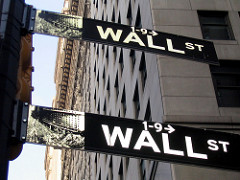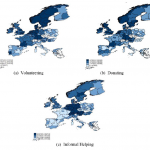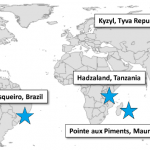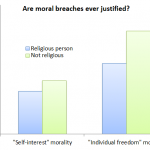
Yeah, I know what you’re thinking. It’s a ridiculous idea, so daft it’s probably not even worth spending time thinking about. But stick with me on this because the analysis is a fascinating one.
I’m talking about a recent study by Benjamin Blau, a finance expert at Utah State University. He picked up on a bunch of evidence that businesses in more religious countries and localities are less likely to take risks.
The problem with these previous studies is that it’s impossible to disentangle variations in local regulations from variations in local religiosity. So he turned to a unique set of data.
He looked at American Depositary Receipts (ADRs), which are traded on U.S. exchanges but represent the shares of foreign companies. The beauty of that is all the companies are traded under the same market regulations, open to the same traders. So the only difference is in the business decisions and trading environment of the companies themselves.
They looked at the stock price records of 355 companies from 37 different countries and a bunch of different ways at looking at the religious makeup of those countries. I want to focus on the percentage of the population who consider themselves to be ‘a religious person’, because I think that this is the best measure of the religious character of a country.
Blau found that every 1% point increase in the number of religious people in a country was linked to a 13% decrease in stack market volatility – an increase that he states is ‘economically significant’.
Now, he found that the fraction of the population that engages in weekly prayer or churchgoing was not linked to stock market volatility. On the other hand, the percentage of adherents to the first and second most popular religions had twice the impact of the ‘religious person’ variable. But this measure is a bit dodgy because it views religion through peculiarly American blinkers – counting Catholics and Protestants as different religions, but lumping all Muslims in together!
Blau gets even stronger results for the correlation with the number of religious affiliates. Unfortunately this is a particularly dodgy measure since a lot of people are religiously affiliated without being particularly religious. That probably explains why being affiliated to Christianity is particularly important – it pretty much just signifies that you’re from Europe.
On the other hand, particular beliefs don’t seem to have any connection. Neither belief in God, Heaven, Hell, or an afterlife is linked to stock market volatility
So what to make of this? Well, I don’t think the effect is nearly as strong as Blau claims, but the fact that there seems to be a trend there with many measures of religious culture, if not of belief, indicates that this is pretty robust.
But what these data don’t support is the idea that fear of divine retribution causes company managers to be more cautious in their dealings. That conflicts with other data suggesting that fear of hell is linked to reductions in murders and other crime. But fits with the idea that people who believe in a controlling God tend to ‘outsource’ punishment of offenders to their god.
Blau thinks that the explanation is that businesses run under religious managers are more risk averse, which fits with a lot of previous research showing that religious individuals are indeed more risk averse.
But the problem here is that these studies are on people who choose to be religious – in other words, more risk averse people are attracted to religion. Simply exposing a random selection of people to religious messaging actually seems to increase their appetite for risk.
An alternative explanation lies in attitudes to corporate governance. Popular culture these days very much accepts the idea that the only responsibility of a company’s board is to maximise returns to shareholders, and that obeying the spirit, rather than the letter, of the law, is perfectly acceptable.
It’s an attitude that leads companies to torture the interpretation of the law until it squeals, and which contributed to the financial melt down of 2008 and the current fixation on growing business through arcane tax dodges rather than on innovation and development.
Growing secularism could be contributing to that trend. Indeed, other recent research has shown that companies in the USA with headquarters in more religious areas engage in more acts of corporate responsibility – although the relationship is weak. And Blau himself found that ex-communist countries have higher stock market volatility, which suggests a cultural effect at work.
My take on all this is that, while religious beliefs don’t affect risky behaviour by company bosses, cultural affiliation with religion, particularly Christianity, certainly seems to!
![]()
Blau, B. (2015). Religiosity and the Volatility of Stock Prices: A Cross-Country Analysis Journal of Business Ethics DOI: 10.1007/s10551-015-2842-7















